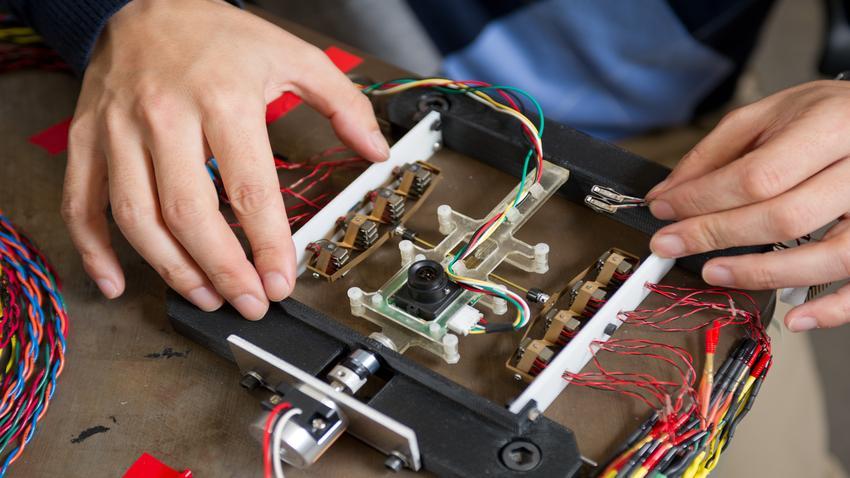
Groups & Labs
Comparch Lab
Faculty: Tom Conte, Hadi Esmaeilzadeh, Hyesoon Kim, Santosh Pande, Milos Prvulovic, Kishore Ramachandran
The Computer Architecture (comparch) Lab conducts research on all aspects of future microprocessor technology including performance, power, multi-threading, chip-multiprocessing, security, programmability, reliability, interaction with compilers and software, and the impact of future technologies.
Data Systems and Analytics Group
Faculty: Joy Alruraj, Xu Chu, Constantine Dovrolis, Vladimir Kolesnikov, Ling Liu, Kexin Rong, Shamkant Navathe, Calton Pu, Jun Xu
We live in an era of unprecedented access to data. Our group tackles new challenges in organizing and leveraging the vast amounts of information at our disposal using data management and machine learning techniques. We participate in a number of cross-disciplinary research efforts, and closely collaborate with other groups at Georgia Tech.
Distributed Data Intensive Systems Lab
Faculty: Ling Liu, Calton Pu
DiSL offers research expertise in distributed and Internet computing systems and distributed data intensive systems. Most of the research projects conducted in DiSL have strong emphasis on systems issues such as scalability, reliability, security, availability and efficiency, and data management issues such as data storage, data mining and data analysis. We are interested in theories and techniques that not only make the distributed systems scalable and efficient but also reliable and secure.
Efficient and Intelligent Computing (EIC) Lab
Faculty: Yingyan (Celine) Lin
The EIC lab in the School of Computer Science at Georgia Tech focuses on developing efficient machine learning (ML) techniques via cross-layer innovations, spanning from artificial intelligence (AI) algorithms to AI hardware accelerators and AI chip design, and aims to foster green AI and ubiquitous AI-powered intelligence.
Embedded Pervasive Lab (EPL)
Faculty: Kishore Ramachandran
Research in the Embedded Pervasive Lab (EPL) covers a range of topics including distributed programming idioms, networked embedded sensors, P2P video streaming, middleware for efficient large-scale stream processing, opportunistic networking, virtualization technologies, and smart storages incorporating Flash-based SSDs. EPL is producing systems for a world where machines, devices and networking technologies work in concert to help individuals use them with as little instruction as possible.
Hardware Security Lab
Faculty: Daniel Genkin
Research in secure hardware design, microarchitectural side-channel attacks, and applied cryptography, at Georgia Institute of Technology.
Internet Intelligence Research Lab
Faculty: Zachary Bischof, Alberto Dainotti, Cecilia Testart, Amanda Meng
The Internet Intelligence Research Lab focuses on understanding and improving the security and reliability of the Internet.
Korvo Research
Faculty: Greg Eisenhauer, Ada Gavriloska, Matthew Wolf, Jeff Young
The Korvo research group of researchers focuses on pushing the boundaries of computer systems research. We take an experimental approach to computer systems, working heavily with industry and governmental stakeholders with real-world problems as motivation for our efforts to refine and fundamentally restructure the way operating systems work. Our interests cover the areas of Cloud Computing, High Performance Computing, and Internet of Things, with particular focus on building systems that can deal with tight orchestration of large streams of data, wherever that data source may come from.
Systems Software & Security Lab
Faculty: Taesoo Kim
In the “SS Lab,” housed within the Georgia Tech Information Security Center, we build practical systems with focuses on security, performance, robustness, or often just for fun. Our research projects have been published in top academic conferences, and have made great impacts on real programs, such as Firefox and Android, that people use every day.
Networks Lab
Faculty: Mostafa Ammar, Constantine Dovrolis, Jim Xu, Ellen Zegura, Russ Clark
Our networks group aims to understand and advance the theory and practice of networks, whether they be mobile, wireless, Internet, campus, home, physical, virtual, human-constructed or naturally occurring. We combine modeling with measurement and experimentation to connect insights to novel approaches to solving problems. Our areas of expertise include network algorithmics, multicast, multimedia, disruption-tolerant networking, mobile computing, network operations, Internet economics, and network science.
Theory Lab
Faculty: Jacob Abernethy, Merrick Furst, Zvi Galil, Richard Lipton, Will Perkins, Dana Randall, Mohit Singh, Sahil Singla, Prasad Tetali, Jan van den Brand, Santosh Vempala
Our theory group has expertise spanning foundations and applications of algorithms and computational complexity theory, including combinatorial optimization, approximation algorithms, randomized algorithms, stochastic processes, spectral methods, algorithmic game theory, high-dimensional geometry, network models, and cryptography. The theory group also constitutes some of the core faculty of both the College of Computing’s Algorithms & Randomness Center (ARC) and Georgia Tech’s Ph.D. program in Algorithms, Combinatorics and Optimization (ACO).
